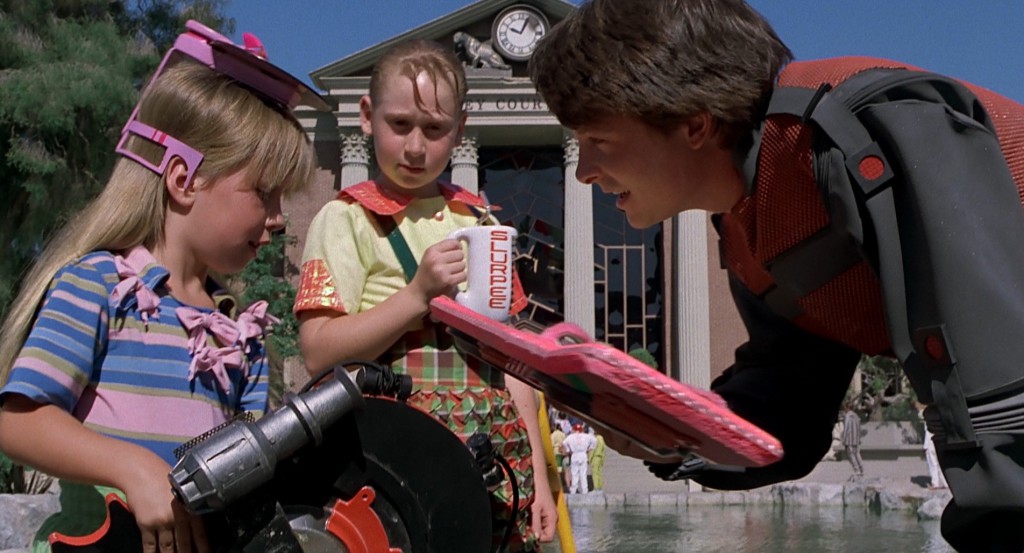
Human being is storied being. We find meaning in our present according to where we’ve been and where we’re going. This is why a condition like PTSD is so devastating. By making the traumatic past ever present it robs a person of the ability to narrate their own story or even sometimes to have much of one.

A recent little piece by theologian Peter Leithart reminded me just how central the tug forward is for us if we’re to live anything like a meaningful life. Leithart points out the curious fact that, at the end of the book of Revelation, the heavenly city descends not once but twice. Even more curious is the fact that the vision of the first descent is that of the adorned heavenly city after judgment and the reconciliation of all things. The second vision (Revelation 21:9-22:5) is a vision of the present heavenly city, the pilgrim city that exists in the time between the times. Leithart thinks this is no incidental redactive move:
It seems odd that the future city is portrayed first. We think of time flowing from past through present to the future. But our lives don’t actually work that way. Aristotle describes four causes – formal (shape), material (stuff), efficient (agent), and final (aim or purpose) – and says that the final cause is the first cause. We decide what we want to accomplish, and then we work backwards. We have an aim or vision, and then we try to grope toward the fulfillment of that vision. The vision may be quite vague and incomplete, more an intuition or an ambition than a portrait; but it’s enough to move us forward. And as the vision gets clarified, the steps we need to take to realize the vision become clearer as well… That is the movement of artistic creation, of political life, of family life, and of human life in general. Aristotle uses the example of a sculptor to illustrate his causes. We first ask what it is we want to accomplish, the purpose for our work, and then we backfill. In most every important endeavor of life, it’s future first.

One needn’t consult Aristotle or apocalyptic literature from sacred texts to see how obviously true the above insight is. Just look to those people in your life who are pretty good organizers of things like parties or other social events. They start from the vision of conviviality or collegial collaboration that is the desired end of the gathering and work back from there to get a handle on the requisite details. While the past inextricably shapes who we are, we aren’t so fully oriented towards it as we are towards the future in all things big and small. Even our everyday utterances are primarily forward thinking, as Robert Jenson notes in Story and Promise:
The meaningful world which we evoke as we speak is a world with a future. For, of course, the meaning of any event or thing must be future to it. Thus every utterance, in that it modifies our meaningful world, in some way poses a future. With something like “I love you,” it is obvious how the speaking of it opens an entirely new life for the hearer—even if he rejects the offer, his life will never be quite the same again. But also something at the other extreme, like a new physical hypothesis, opens both a new and possibly endless task of testing by experiment, and unpredictable possibilities of new experience and orientation in the world. So our fundamental question about utterance can be reformulated: how does a particular utterance pose a future to its hearer? Clearly, a promise poses a future in a very particular way: as gift…All the rest of our communication, various as it is, shares one common character: it poses a future not as gift but as obligation.
Jenson points out that what the theological tradition has labeled “law” is quite simply the entire web of human communication and speech acts which open a future to us that is one not of promise but obligation. Criminal and civil laws are paradigmatic instances of this but are by no means unique. Law always says if you do this, then that will follow. It offers a future, but a future bound to the past. The possibility offered by “if-then” is bound up with what you did before the “then”. Jenson concludes, “…on this that I do or fail to do therefore falls the weight of the utterance; it is a demand on my performance.”
 What we want everyday in our heart of hearts is to be offered a future that comes to us as promise. Most days, however, the future offered to us is one that is conditional and rooted in daunting demands and obligation. Nowhere is this more devastating than in the pursuit of romantic love. When trying to couple up we’re looking for a future offered as promise, where we love and are loved unconditionally. But the road to getting there involves all sorts of self-curating and suggested-selling of ourselves. We do our best to present ourselves as lovable (conditionally) so that eventually we might be able to take the mask off that we donned in order to draw in our potential partner and reveal our true selves, warts and all–an actual human being who, it turns out, can only be loved without condition. And online dating makes all this worse!
What we want everyday in our heart of hearts is to be offered a future that comes to us as promise. Most days, however, the future offered to us is one that is conditional and rooted in daunting demands and obligation. Nowhere is this more devastating than in the pursuit of romantic love. When trying to couple up we’re looking for a future offered as promise, where we love and are loved unconditionally. But the road to getting there involves all sorts of self-curating and suggested-selling of ourselves. We do our best to present ourselves as lovable (conditionally) so that eventually we might be able to take the mask off that we donned in order to draw in our potential partner and reveal our true selves, warts and all–an actual human being who, it turns out, can only be loved without condition. And online dating makes all this worse!
No longer does the dance of give-and-take that we all do in the overture stage of courtship unfold organically over the course of time, sometimes sneaking up on us as our feelings for a friend, colleague or neighbor change. Now it’s front-loaded to the anxiety-inducing first date which comes as a result of each participant meeting a series of criteria first proffered via a profile. Some of the criteria you’re aware of and have a sense of whether you meet the standards, but some are hidden. There are both visible and invisible checklists for both parties involved. Online dating maybe the clearest example, outside of criminal and civil proceedings, of the law’s power to present a future that is daunting and depressing in proportion to what it demands from the subject. Not only do you have to survive being endlessly evaluated by potential partners, you also have the pressure of making “the right choice”, with unprecedented amounts of information to go by on the front end. Eva Illouz describes this dynamic in an essay entitled “Love and Its Discontents: Irony, Reason, Romance”:
By enabling users to investigate a vast number of options, the internet encourages the maximization of partner selection in unprecedented ways, in stark contrast to the methods of premodernity. Maximization of outcome has become a goal in and of itself. For example, many respondents to an open-ended questionnaire about the uses of Internet dating sites declared the choices available were so large that they would get in touch only with people who corresponded very precisely to their diverse aspirations. Moreover, the majority of respondents reported that their tastes changed in the course of their search and that they aspired to “more accomplished” people than they did at the beginning of the search. Clearly the case of online dating shows that actors use elaborate rational strategies to achieve their romantic desires, thus confirming Smelser’s and Alexander’s claims that computer technology has a strong rationalizing effect: “the gradual permeation of the computer into the pores of modern life deepened what Max Weber called the rationalization of the world.”
…Like no other technology, the internet has radicalized the notion of the self as a “chooser” and the idea that the romantic encounter should be the result of the best possible choice. That is, the virtual encounter has become hyper-cognized, the result of a rational method of gathering information to select a mate. It has literally become organized as a market, in which one can compare “values” attached to people, and opt for “the best bargain.” The internet places each person searching for another in an open market of open competition with others, thus radicalizing the notion that one can and should improve one’s romantic condition and that (potential or actual) partners are eminently interchangeable.
Illouz goes on to suggest that irony has replaced playfulness as the dominant trope and tone of our times. Intensity is irony’s opposite and it some ways its nemesis. Irony is a “figure of speech that feigns ignorance; it feigns ignorance but counts, for its effect, on the knowledge of the hearer.” Irony is the “trope of the person who knows too much but refuses to take reality seriously.” The three experiences that demand irony’s elimination or are precluded by irony’s presence are, according to Illouz, raw grief or suffering, religious transport, and sexual passion. She concludes the essay with this penetrating observation:
Modern romantic consciousness has the rhetorical structure of irony because it is saturated with knowledge, but it is a disenchanted knowledge that prevents full belief and commitment. Thus, if love is a modern religion, as has often been claimed, it is a peculiar one indeed, for it is a religion that cannot produce belief, faith, or commitment.
The sting of the law here produces not an instant death, but a slow one brought about by dehumanizing forms of detachment that come as a result of being drained of the possibility to hope for the future as a gift and a promise.
If the Law and the crippling demand it makes comes via its dreadful “if-then”, the promise comes via the opposite: “because-therefore”. As Jenson points out, the law makes the future dependent on the past, one that is unchangeable. But promise makes the past depend on the future, “for it grants a future free from the past, and so allows us to appropriate the past in a new way.” Jenson stresses that this is the whole point of all the “biblical and churchly talk about ‘forgiveness;’ if we are accepted in spite of what we have been, we are thereby permitted to appropriate what we have been afresh, as the occasion of that acceptance.”
We play the dating game with all of its demands because if we win we get to hear what are on the horizontal plane the most promising words of all: “for better or worse, for richer or poorer, in sickness and in health”. But can we ever guarantee we can be faithful to the promises we make at the altar? Or that nothing our spouse does to us or we to them might somehow alter the nature of the promise?
All promises made by human beings are made in the shadow of the valley of death. If I die, what good am I to the one I made promises to? Jenson observes that it’s only in “destructive enterprises such as war” that it is otherwise. Any implicit condition can quickly turn a promise into law “just when it is most needed: just when my spouse does the one thing that threatens me so deeply that—even for her sake!—I must flee, is probably the moment when she needs me most.”
Even nuptial vows can’t offer a truly unconditional future. The only promise that could truly offer this is one made from the other side of death. The only kind of promise that can offer a truly unconditional future is one made by someone who died for the promise’s sake. This is a truly irreversible promise. And the story of that promise has to be death and resurrection. It’s a promise that will echo forever throughout the cosmos at the Wedding Supper of the Lamb.

COMMENTS
Leave a Reply













